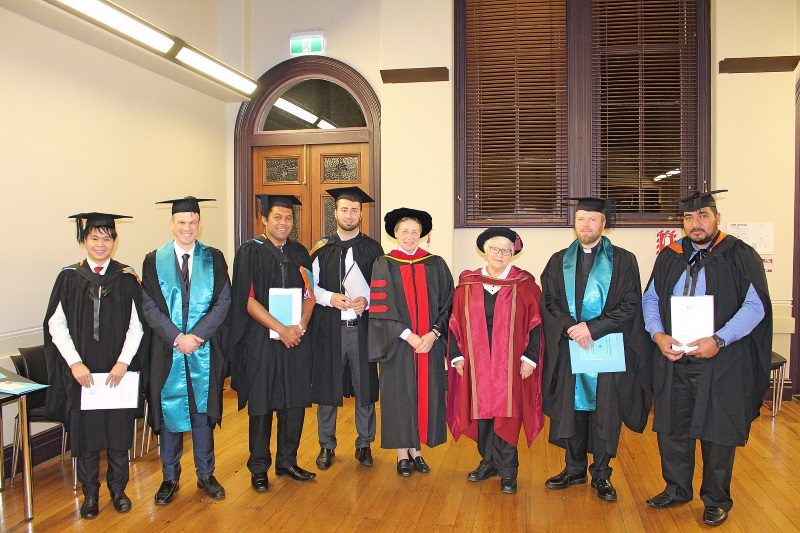The early missionaries to Oceania might have found the going tough at times, but being a modern missionary in our own society has its own set of very real challenges.
Barrister and historian Eugénie Laracy touched on some of these challenges — both historic and modern — during her address at the Good Shepherd College graduation ceremony at the St Columba Centre in Ponsonby on June 8. She also shared some thoughts on how “priests and practitioners” these days could be best equipped to “go forward into the storm”.
With her husband, the late Associate Professor Hugh Laracy, Mrs Laracy co-authored many publications about Pacific history, including seminal works about the Catholic mission to Oceania.
At the St Columba Centre, she told those graduating with Bachelor of Theology degrees and with Graduate Diplomas in Theology, that her late husband “would have pointed out that you are now missionaries of the Church of New Zealand”.
But he would also have drawn their attention to the history of missionary work in our part of the world, with all the deprivations, hardships and challenges that entailed.
“When I think of those early missionaries, I cannot but marvel at their dedication, their conviction that they would bring the Word of God to far lands, and what’s more that they would be effective and would succeed,” Mrs Laracy said.
The early missionaries to Oceania were “religious” and “brave”, she added.
“These days, you who are going on to ordination are not called to be missionaries such as staffed the Solomons,” Mrs Laracy said. “Pope Francis is interested in missionaries of their own society, of their own culture.”
“In my opinion, for a priest, and for other workers in our culture and society, it is just as difficult as it was in the old missionary days.
“Fr Gerald Arbuckle, a Marist, talks about present society in his book “Violence: Society and the Church”. He writes that the expression of one’s faith through one’s culture, means that faith must become an integral part of the cultural community, that Christ must become an
integral and fully functional part of the local culture.
“And for you, the graduates, when you look around Auckland, that is a very big ask.”
Mrs Laracy, who served for 17 years on the Good Shepherd College Senate, said that in crossing Queen Street in Auckland, “one can’t help but notice the great range of people who have a different cultural and ethnic background from when I and some of the others here were growing up”.
“So working in our society is a huge challenge. The priest or the practitioner requires the ability to listen, but not just to hear, but to listen, meaning looking at the eyes of the person who is trying to express their problem, trying on your part to exercise good judgement and patience, compassion and respect, dialogue and collaboration and the ability not to give up.”
“There are big issues to contend with,” she noted. “There’s gender, equality, the environment, economics, questions of retirement, even . . questions about cows
and pine trees.”
But she recommended two things to help those embarking on such a challenging path — having good friends and reading good books.
“I noticed while reading Nicholas Reid’s latest book on Cardinal Delargey, that the cardinal had plenty of friends, and he really, really valued them and their assistance,” Mrs Laracy said.
“So if cardinals need good friends, we need good friends too. Some friends will be more special to you than others, in terms of the advice they are equipped to give you, the guidance and judgement. But we need to maintain our friendships and we need to feed them.”
“And reading good books is essential . . . Not just the ubiquitous Kindle, but books that can live with you. They are there to have, to hold, to return to, to contemplate over.”
Mrs Laracy also cited a plea by the late Msgr Vincent Hunt “for art”.
“The works of builders, sculptors, musicians and poets have played an irreplaceable part in the life of the Church. We see there the faith and genius that has been imprinted deeply within the Christian consciousness. We gain light and strength from what these people have
produced. Fr Hunt exhorts those preparing for priesthood to have a serious engagement with Christian art and its role in the Church.
“My advice for life is to be as broad as possible in what you consume. Don’t limit yourselves either to Christian art. Read widely, including about the things you know nothing of and have no interest in. Learn, it is the best way to obtain that broadmindedness that you in particular will need to pick your way through the challenges of being comfortable missionaries amongst your own culture.”

Reader Interactions